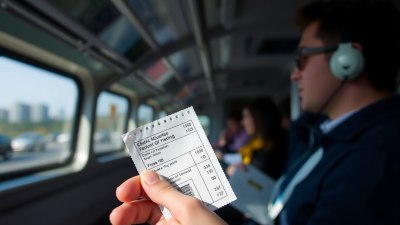Your Ticket Expired the Moment You Used It
Explore the implications of ticket expiration and the rules that govern it.

When it comes to transportation, entertainment, or any service that requires a ticket, understanding the concept of ticket expiration is crucial. Many people often overlook the importance of knowing when their ticket is valid.
In various industries, tickets serve as proof of purchase and entitlement to access a service or an event. However, these tickets can come with specific terms and conditions that dictate when they are valid. One common concept is that your ticket may expire the moment you use it.
The Nature of Ticket Expiration
Tickets, whether for a concert, a train journey, or an amusement park, have expiration mechanics that are often laid out in the fine print. When an individual purchases a ticket, they are essentially entering a contract with the service provider. This contract often specifies the terms of usage, including the potential for the ticket to be rendered invalid after its use.
This phenomenon is particularly common in the transportation industry, where a ticket's validity may only extend to a single journey. Once the passenger boards the train or the bus, the ticket is deemed used and, consequently, expires, leaving no room for re-entry or return trips without a new purchase.
Types of Ticket Expiration
There are several types of ticket expiration policies that are prevalent across different sectors. Understanding these can help consumers make more informed decisions.
Single-Use Tickets: Most commonly found in public transportation, single-use tickets expire the moment they are validated or scanned for use. This means that once you have entered the service, the ticket cannot be reused.
Entry Tickets: For events such as concerts, theater performances, and sports games, a ticket is usually valid for entry to a specific event on a specific date and time. Once you enter the venue, the ticket typically cannot be used again for re-entry or admitted to any other event.
Time-Limited Tickets: Some services offer tickets that are valid for a certain period, such as a day or week pass. These tickets may allow unlimited access during that defined timeframe but will expire once the time has elapsed.
Understanding Terms and Conditions
Before purchasing a ticket, it's essential to read the terms and conditions thoroughly. Many consumers fail to do this, which can lead to unexpected inconveniences. Service providers often include clauses regarding expiration and restrictions in their ticket policies. By not being aware of these rules, customers may find themselves unable to use their tickets as intended.
For example, a train ticket may only be valid for a direct route. If a passenger misses their train and tries to take an alternative route using the same ticket, they may discover that their ticket has expired.
The Consequences of Expired Tickets
Using an expired ticket can lead to various consequences. In many cases, one may be required to purchase a new ticket to continue their journey or gain entry to an event. Furthermore, some service providers enforce strict penalties for ticket misuse or expired tickets, including fines or bans.
Understanding the consequences reinforces the importance of being aware of ticket expiration policies. Passengers and attendees who are informed are less likely to encounter complications that arise from not adhering to the requirements.
Best Practices for Ticket Management
To avoid issues related to expired tickets, consumers can adopt a few best practices:
Keep Documentation Handy: Always keep your ticket and any associated documentation readily available. This can help clarify any misunderstandings with service providers.
Set Reminders: If you purchase a time-limited ticket, set reminders on your phone or calendar to ensure you're aware of the ticket's expiration date.
Use Digital Tickets: Digital ticket options often come with added features, such as alerts and notifications, which can help manage expiration more efficiently. Many apps will notify you of valid entry times or usage dates.
Case Studies: Real-World Implications
To better illustrate the significance of understanding ticket expiration, let’s look at a few case studies:
Case Study 1: Train Travel - A passenger purchases a one-way ticket from City A to City B. Upon arrival at City B, they decide to visit a nearby town but don’t realize that their ticket to City B is no longer valid for the return journey. They end up having to buy a new ticket, despite planning carefully.
Case Study 2: Concert Entry - A concertgoer arrives late to an event and finds that their ticket has expired, as it is no longer valid after the concert begins. The event organizers enforce strict entry policies, resulting in the individual being turned away. In this case, knowledge of ticket validity was key to successful entry.
Conclusion
In conclusion, ticket expiration is a fundamental aspect of ticket-based services that individuals must understand to avoid unnecessary complications. Whether it’s for transportation, entertainment, or any other service, being aware of when your ticket becomes invalid can save time, money, and frustration. Always remember: your ticket often expires the moment you use it, and being informed is your best strategy in navigating ticket policies effectively.











